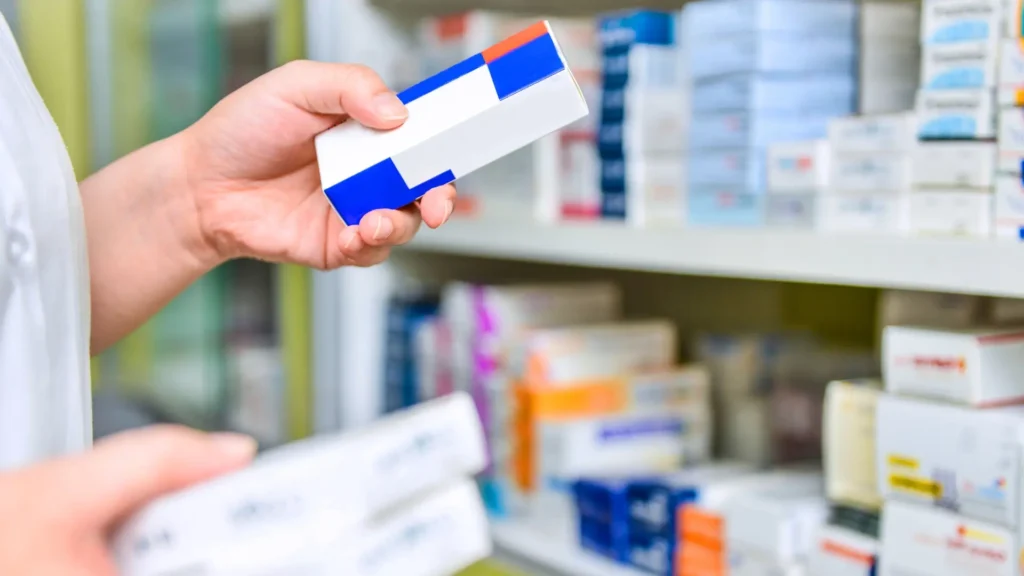Apalutamide is a medication specifically designed to combat prostate cancer, offering hope to those diagnosed with metastatic castration-sensitive prostate cancer (mCSPC) and non-metastatic castration-resistant prostate cancer (nmCRPC).
While this drug has the potential to manage and alleviate the condition, it also has side effects that can range from mild discomforts like tiredness to more severe reactions such as drug allergy.
What is Apalutamide?

Apalutamide, known by its brand name ERLEADA, is a medication specifically designed to treat two challenging forms of prostate cancer: metastatic castration-sensitive prostate cancer (mCSPC) and non-metastatic castration-resistant prostate cancer (nmCRPC). Its primary function is to target and inhibit androgen receptors.
Treating mCSPC & nmCRPC
Both conditions are uniquely problematic due to their progression with low testosterone levels. Apalutamide extends survival in mCSPC and delays metastasis in nmCRPC.
Inhibiting Androgen Receptors
Androgens, like testosterone, fuel prostate cancer growth. Apalutamide binds to the androgen receptors on cancer cells, preventing these hormones from promoting cancer cell proliferation.
This mechanism is a cornerstone of hormone therapy for prostate cancer, aiming to reduce the hormone’s ability to stimulate tumor growth. Through this targeted approach, Apalutamide helps manage the disease by effectively disrupting the cancer’s growth signals.
Guidelines for Taking Apalutamide
When prescribed Apalutamide, follow these instructions for the best results:
- Oral Tablet: Take Apalutamide as an oral tablet.
- Frequency: It is recommended to take the medication once daily.
- Food: You can take Apalutamide with or without food according to personal preference or convenience.
- Missed Dose: If you miss a dose, take it as soon as you remember on the same day. If a whole day has passed, skip the missed dose and continue with your next scheduled dose the following day. Do not double up doses to compensate for the one missed.
Sticking to these guidelines is key for maintaining consistent levels of the medication in your body and managing your prostate cancer effectively.
Managing Side Effects and Precautions of Apalutamide Treatment
Apalutamide treatment can cause common side effects like weakness, tiredness, joint/muscle pain, diarrhea, nausea, weight loss, and hot flashes. To manage these, it’s important to stay in touch with your healthcare provider. They can provide guidance on effective strategies such as:
- Resting when needed
- Engaging in regular exercise
- Adjusting your medication if necessary
- Making dietary changes
A crucial precaution during Apalutamide therapy is the use of effective birth control methods. Both men and women undergoing treatment need to prevent pregnancy due to the potential risk to an unborn child from this drug. Consult your doctor for advice on suitable contraceptive methods.
Recognizing and Addressing Rare but Serious Effects of Apalutamide
While most patients tolerate Apalutamide well, it’s important to know about potential rare but serious side effects. If you experience any of the following, make sure to promptly inform your healthcare provider:
- Seizures
- Sudden loss of consciousness
- Noticeable swelling in the arms or legs
- Severe chest pain
- Unexplained shortness of breath
These symptoms could indicate a serious complication that requires immediate medical attention. Being aware of these possible side effects is crucial for your overall well-being during Apalutamide treatment.
Drug Interactions: What to Avoid with Apalutamide
Apalutamide, like many prescription drugs, may interact with other medications, both prescription and non-prescription. This interaction can alter the way either medication works or increase the risk of adverse effects. Interactions are not just limited to other drugs. Vitamins, dietary supplements, and even certain foods may pose a risk.
To ensure your safety:
- Keep an updated list of all the medicines you take.
- Don’t forget to include vitamins and supplements.
- Share this list with your healthcare provider.
This way, they can guide you on what to avoid when taking Apalutamide. It’s also important to mention any new medication you’re considering starting to your doctor. They can advise if it’s safe to combine with Apalutamide.
Remember, drug interactions can compromise the effectiveness of treatment and pose additional health risks. Always consult with your healthcare provider before adding or removing any medicine from your regimen while on Apalutamide.
Proper Storage and Disposal of Apalutamide
Storing Apalutamide Correctly:
- Keep the medication in its original container, tightly closed, and out of reach of children.
- Store at room temperature, away from excess heat and moisture (not in the bathroom).
Safely Disposing of Apalutamide:
- Do not dispose of unused Apalutamide down the toilet or drain unless instructed to do so.
- Check for a medication take-back program in your area or consult your pharmacist about how to safely throw away medication that is no longer needed or expired.
Seeking Additional Support and Clinical Trial Opportunities
Aplutamide treatment, though effective, can be a demanding experience. Singapore-based cancer support resources and programs such as the Singapore Cancer Society and Cancer Helpline (+65 6225 5655) are established to assist patients throughout this journey. They provide personalized care, patient education, and additional support to ease the process.
For those who are keen on contributing to medical advancements in Apalutamide treatment, considering participation in clinical trials could be an option. The National Cancer Institute of Singapore routinely updates its list of cancer clinical trials accepting patients for Apalutamide treatment. Participation not only contributes to medical research but also provides opportunities to access new treatments before they become widely available.
As always, please consult a healthcare professional for more information!
Read More: Azathioprine: What is it and What you need to Know


